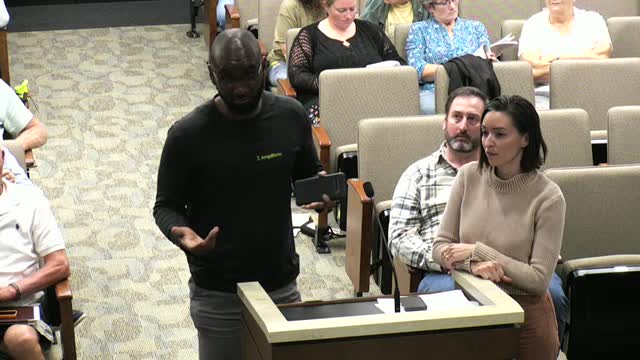Planning commission defers decision on West Petersburg rezoning to allow applicant to consider voluntary proffers
Get AI-powered insights, summaries, and transcripts
Subscribe
Summary
The commission deferred action on rezoning 22 West Petersburg lots to Residential Urban, asking the applicant to consider voluntary proffers on lot groupings (setbacks/spacing, stormwater help) after residents raised concerns over density, flooding and narrow streets.
The Dinwiddie County Planning Commission on Oct. 8 deferred consideration of rezoning case P‑25‑13, which would reclassify 22 small lots in the West Petersburg neighborhood from R‑1 (Residential Limited) and B‑2 (Business General) to RU (Residential Urban).
Why it mattered: the rezoning would allow development of single‑family homes on the narrow, historic lots in West Petersburg and is intended by the applicant to enable more homeownership and renovation in an older neighborhood. Dozens of neighbors attended and urged caution, citing existing flooding, narrow streets, crowded lot patterns and the appearance and siting of recently built homes.
What the proposal would do: the applicant, a developer who has renovated a nearby West Petersburg house, said the RU zoning would permit houses sized and sited to fit the neighborhood and would allow owners to build without assembling large numbers of adjacent lots. The applicant and staff said the lots are typically 25 by 100 feet and many existing houses occupy two platted lots; staff recommended approval because RU is consistent with the town‑center designation in the county comprehensive plan and with surrounding zoning and lot patterns.
Public concerns and staff discussion: residents described repeated flooding and drainage problems in parts of West Petersburg, narrow streets and limited off‑street parking, houses that appear visually crowded and a sense that outreach and notice of earlier meetings had been inadequate for long‑time residents. Several residents urged the commission to require improvements to drainage or culverts and to consider impacts to emergency access and quality of life. The applicant said new houses would have paved driveways allowing two side‑by‑side cars and that planned houses would not be pushed to the five‑foot minimum side setbacks; the developer indicated typical house plans would create roughly eight feet of side yard on each side (for example, a 30–32 foot‑wide house on two combined lots).
Commission action and reasoning: commissioners discussed the variable character of the 22 lots and suggested the applicant might consider voluntary proffers for individual lot groupings (for example, minimum side spacing, driveway/parking configuration, or voluntary modest stormwater measures for lots identified as prone to flooding). Commissioners also noted the administrative complexity of paper streets and drainage responsibility and said those infrastructure issues are distinct from a rezoning.
Next steps: the commission voted to defer P‑25‑13 for one month to allow the applicant time to consider voluntary proffers by individual lot groupings and to coordinate with staff. The deferral keeps the public hearing open and allows the applicant to return with written proffers or clarified plans; it does not approve rezoning. The applicant said a short deferral would create delay but was willing to consider proffers.
Community context: multiple speakers urged the county to address existing drainage and VDOT maintenance issues as part of any neighborhood expansion and to ensure that new construction does not exacerbate stormwater or emergency‑access concerns. Several speakers said they had not received prior notice of the earlier outreach meeting or did not learn about the project until recently.
